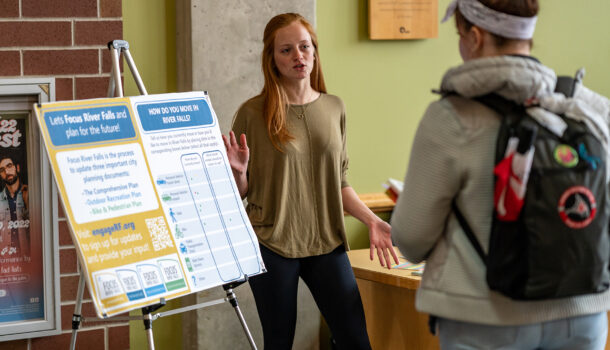ABOVE PHOTO: Former UW-River Falls student CJ Sycks speaks with an onlooker during an event in 2022 at the university at which conservation and environmental planning students solicited ideas about planning issues facing the city of River Falls. The Universities of Wisconsin Board of Regents has approved starting a new undergraduate community and environmental planning degree at UW-River Falls that will develop skills specific to urban planning. UWRF file photo.
River Falls Students seeking to design communities now and into the future will have the opportunity to learn those important, in-demand skills at the University of Wisconsin-River Falls following the addition of an undergraduate community and environmental planning degree at the university.
The Universities of Wisconsin Board of Regents voted Friday to add the new bachelor of science degree at UW-River Falls. The program will be offered as a major at the university beginning this fall.
UW-River Falls will be one of relatively few universities nationally, and the only Universities of Wisconsin school, to offer an undergraduate planning degree with a specific focus on urban planning. UWRF officials said the program will build on the university’s existing conservation and environmental planning degree and will complement programs in the university’s Plant and Earth Science Department.

The new degree is the result of a recommendation from the UWRF Plant and Earth Science Department to elevate the program, which will strengthen recruitment efforts. The degree will prepare students for careers in areas such as environmental planning, urban and regional planning, and public administration.
The new degree will provide clarification for students and their potential employers because it will focus on developing skills specific to urban planning, said Christopher Holtkamp, associate professor of conservation and environmental planning. Surveys show growing demand for jobs related to community planning.
“Among the benefits of the new degree will be to raise the profile of the program to attract more students to it,” Holtkamp said. “We will be one of the few undergraduate planning programs available, which should generate interest.”
Coursework will incorporate the skills taught in existing classes, such as public administration, public policy, and urban geography to broaden students’ perspectives.
“This program will help us better serve students with an interest in planning and fill employment demand,” said Holly Dolliver, professor of soil and geology science and chair of the Plant and Earth Science Department. “This new degree compliments the array of programs in the Plant and Earth Science Department and further strengthens the multidisciplinary training and experiences we provide students.”
The community and environmental planning program will include study of sustainability measures as they relate to urban planning, Holtkamp said. Students will learn a holistic approach to sustainability and how communities can better address social, economic, and environmental challenges.
“Given that urban areas continue to grow and are facing increased challenges, the job for planners is increasingly important,” Holtkamp said. “Well-trained planners can bring a holistic approach to addressing these issues, and our program will develop the skills needed for that career.”
The new degree will build on UWRF’s history of successfully preparing graduates for planning careers through an option in the university’s existing conservation major, said Wes Chapin, interim provost and vice chancellor for academic affairs. The focus on a hands-on, experiential learning approach is especially effective at preparing program graduates who are high-quality employees, he said.
“The proposed community and environmental planning major builds on that option and will position UW-River Falls to fill a niche that is not available at other UW schools,” Chapin said, noting that demand for planning graduates in Wisconsin and across the nation is strong.


